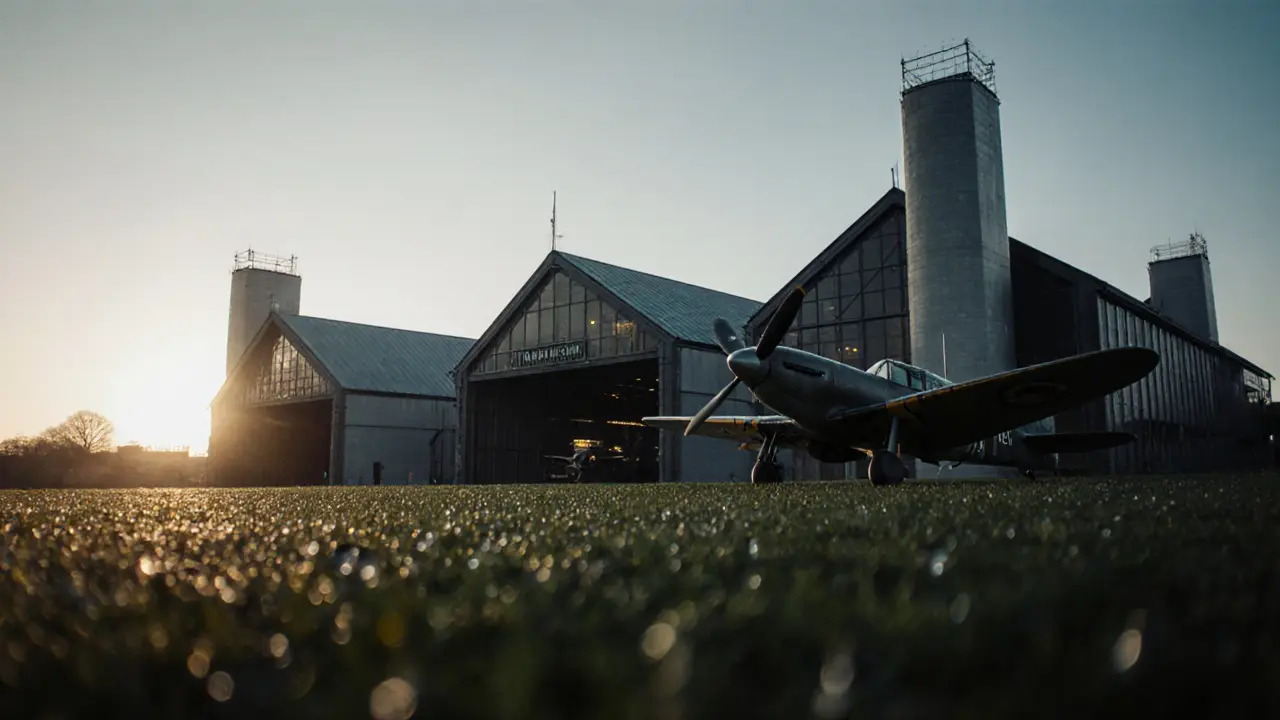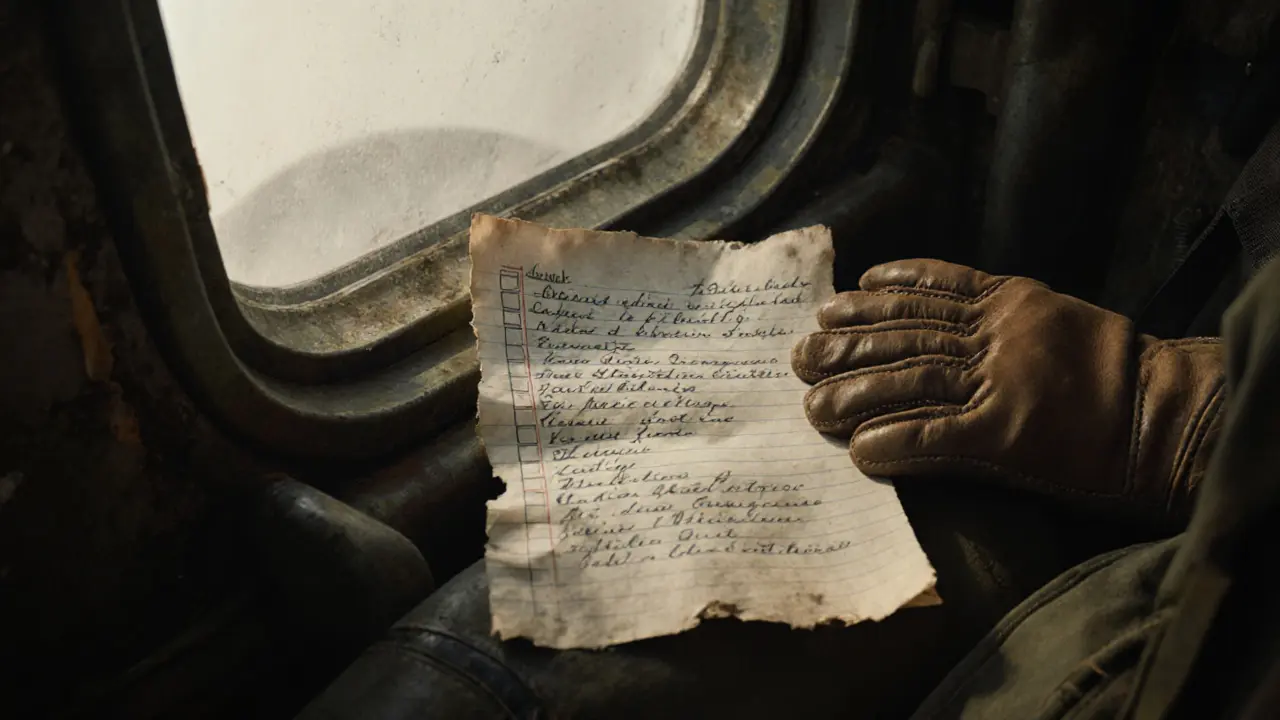When you think of the RAF Museum London, you might picture vintage fighter planes, dusty uniforms, and faded photographs of pilots from decades past. But what if those same planes, those same stories, hold quiet lessons for how you live today? The museum isn’t just a collection of machines-it’s a library of human discipline, resilience, and purpose. And those qualities? They’re not locked in glass cases. They’re yours to borrow.
Understanding the Basics of RAF Museum London Lifestyle Tips
Origins and History
The RAF Museum London, opened in 1972 and housed in a former aircraft factory in Hendon, tells the story of Britain’s air force from its founding in 1918 through the Cold War and beyond. But beyond the Spitfires and Lancasters, it’s the personal stories that stick: the ground crew who worked 18-hour shifts in the rain to keep planes flying, the pilots who wrote letters home before missions they didn’t expect to return from, the engineers who fixed broken systems with duct tape and sheer will. These weren’t superheroes. They were ordinary people doing extraordinary things under pressure. Their lives weren’t about luxury-they were about precision, routine, and responsibility. That’s the real legacy.
Core Principles or Components
Three core habits echo through every exhibit: Preparation, Adaptability, and Attention to Detail. Pilots didn’t just fly-they rehearsed every maneuver, checked every instrument, anticipated every failure. Ground crews didn’t wait for orders-they spotted problems before they became crises. This isn’t about militarism. It’s about showing up with intention. Whether you’re managing a project, parenting, or just trying to get through your week, these principles cut through noise and create calm.
How It Differs from Related Practices
People often confuse discipline with rigidity. The RAF didn’t demand blind obedience. They demanded competence. Unlike modern productivity gurus who preach rigid schedules, the RAF adapted to chaos. A pilot didn’t cancel a mission because it rained-they adjusted altitude, checked visibility, and went. Compare that to today’s ‘perfect routine’ culture, where missing a morning meditation feels like failure. The RAF model is more realistic: do your best, adapt, and keep going.
| Practice | Key Feature | Primary Benefit |
|---|---|---|
| RAF-Inspired Discipline | Adaptability within structure | Resilience under pressure |
| Modern Productivity Routines | Rigid schedules, strict rituals | Short-term consistency |
| Minimalist Lifestyle | Reducing possessions and choices | Mental clarity |
Who Can Benefit from RAF Museum London Lifestyle Tips?
Anyone who feels overwhelmed by chaos. Parents juggling schedules. Remote workers distracted by endless notifications. Students burning out from perfectionism. The RAF didn’t have time for burnout-they had missions to fly. Their approach is for people who want to be effective, not just busy. You don’t need to love airplanes to use their methods. You just need to want to feel more in control of your days.
Benefits of RAF Museum London Lifestyle Tips for Daily Life
Stress Reduction Through Predictable Routines
Stress doesn’t come from having too much to do-it comes from not knowing where to start. RAF personnel used checklists for everything: pre-flight, in-flight, post-flight. No guesswork. You can do the same. Start your day with a 5-minute checklist: What’s one thing I must finish? What’s one thing I can let go of? It’s not about being perfect. It’s about creating a mental anchor. Research from the American Psychological Association shows that simple routines lower cortisol levels. You’re not training to be a pilot-you’re training to be calmer.
Enhanced Focus Through Attention to Detail
At the museum, you’ll see a single screw labeled with its serial number, tracked through every repair. Why? Because a loose screw could mean a failed mission. In your life, small things matter too. A missed email. A forgotten appointment. A rushed meal. The RAF teaches that mastery lives in the details. Try this: pick one daily task-brushing your teeth, making your bed, checking your calendar-and do it with full attention. No multitasking. Just that one thing. Over time, your brain learns to focus. That focus spills over into everything else.
Emotional Well-Being Through Purposeful Action
Many RAF personnel knew they might not come home. Yet they still showed up. Not because they were fearless, but because they believed in their role. Purpose isn’t about grand missions. It’s about knowing why you’re doing what you’re doing. When you clean your kitchen, are you doing it because it’s ‘supposed’ to be done-or because it’s a quiet act of care for the people you live with? That shift-from obligation to intention-changes everything. It turns chores into rituals and routines into meaning.
Practical Applications for Modern Life
Here’s how this looks in real life:
- Before a meeting, write down: What’s the goal? What’s my one contribution?
- Keep a ‘pre-flight’ checklist for your week: 3 priorities, 1 backup plan, 1 thing to let go.
- When overwhelmed, ask: ‘What’s the next small step?’-not ‘How do I fix everything?’
| Benefit | Description | Impact |
|---|---|---|
| Reduced Decision Fatigue | Using simple routines for daily tasks | More mental energy for important choices |
| Improved Reliability | Consistent follow-through on small commitments | Others trust you more |
| Greater Resilience | Adapting to setbacks without self-blame | Faster recovery from stress |
| Clearer Priorities | Focusing on one critical task at a time | Less overwhelm, more progress |
What to Expect When Engaging with RAF Museum London Lifestyle Tips
Setting or Context
You don’t need a hangar. You just need a quiet corner-your kitchen table, your desk, even your car before you start driving. The space isn’t the point. The mindset is. Think of it like stepping into the cockpit: everything around you is background noise. Your job is to focus on what matters.
Key Processes or Steps
Start small. Pick one area of your life where you feel scattered-morning routine, work tasks, evening wind-down. Then apply the RAF three-step method:
- Plan: Write down what needs to happen.
- Check: Verify you’ve done the essentials.
- Adapt: If something changes, adjust without panic.
That’s it. No apps. No fancy tools. Just clarity.
Customization Options
There’s no one-size-fits-all RAF routine. A night shift engineer’s checklist looks different from a pilot’s. Your version should too. If you’re a parent, your ‘pre-flight’ might be packing lunches and checking school forms. If you’re a freelancer, it might be confirming client deadlines and backing up files. Tailor it. Make it yours.
Communication and Preparation
RAF crews communicated constantly-not just with orders, but with quiet nods, hand signals, shared glances. In your life, that’s about setting clear boundaries. Tell your housemates: ‘I’m doing my 5-minute prep from 7-7:05, then I’m all yours.’ Or tell your team: ‘I’ll respond to emails after 3 PM.’ You’re not being rude. You’re being reliable.

How to Practice or Apply RAF Museum London Lifestyle Tips
Setting Up for Success
Start with one physical space: your phone, your desk, your calendar. Delete three apps that drain you. Clear your desk of clutter. Block one hour on your calendar for ‘no interruptions.’ These aren’t luxuries-they’re your runway. You can’t fly if the tarmac is covered in debris.
Choosing the Right Tools
You don’t need a $200 planner. A sticky note works. A notebook. A digital to-do list. The tool doesn’t matter. What matters is that you use it consistently. If you like paper, use a simple grid. If you prefer apps, try Google Keep or Notion-just stick to one. Don’t collect tools. Use them.
Step-by-Step Guide
Here’s your 7-day RAF-inspired starter plan:
- Day 1: Write down your top 3 priorities for the day.
- Day 2: Before starting work, ask: ‘What’s the one thing that’ll make today worthwhile?’
- Day 3: At lunch, check: Did I do what mattered? If not, why?
- Day 4: Before bed, write one thing you did well-even if it was small.
- Day 5: Identify one task you’ve been avoiding. Break it into two tiny steps.
- Day 6: Do those two steps. No perfection. Just action.
- Day 7: Reflect. What changed? What felt better?
Tips for Beginners
Don’t try to overhaul your life. Pick one habit. Stick to it for two weeks. If you miss a day? No guilt. Just restart. The RAF didn’t ground pilots for one missed checklist-they taught them to do better next time. That’s the spirit.
FAQ: Common Questions About RAF Museum London Lifestyle Tips
What to expect from RAF Museum London lifestyle tips?
You won’t suddenly become a disciplined soldier. But you will start noticing small patterns: how you respond to stress, how you handle distractions, how you prioritize. These tips aren’t about becoming someone else-they’re about uncovering the version of you that’s already capable, calm, and in control. Expect more clarity, fewer last-minute scrambles, and a quieter mind. It’s not magic. It’s method.
What happens during a typical RAF-inspired routine?
There’s no ceremony. No chanting. Just a quiet moment of preparation. You might spend 3 minutes listing your top task, 2 minutes checking your calendar, and 1 minute breathing before you start. That’s it. The power isn’t in the length-it’s in the intention. You’re training your brain to enter ‘focus mode’ on purpose, not by accident.
How does RAF-inspired discipline differ from bullet journaling?
Bullet journaling is creative, expressive, and often complex. RAF discipline is functional and stripped down. You don’t need color-coded systems or decorative icons. You need one clear question: ‘What’s the next step?’ Bullet journals help you reflect. RAF methods help you act. You can use both-but if you’re overwhelmed, start with the simpler version.
What is the method of RAF-inspired living?
The method is simple: Plan. Check. Adapt. Repeat. It’s not about perfection. It’s about presence. You don’t need to do everything right-you just need to do the next right thing. That’s how missions were flown. That’s how lives are rebuilt. One small, intentional step at a time.
Safety and Ethical Considerations
Choosing Qualified Resources
You don’t need a coach or a course to apply these tips. The RAF Museum’s website offers free digital exhibits and historical accounts that are reliable and well-researched. Avoid blogs promising ‘military-grade productivity hacks’-they’re often just rebranded hustle culture. Stick to primary sources: museum archives, official RAF histories, and verified public records.
Safety Practices
These tips are low-risk. But if you’re using them to avoid dealing with deeper stress or trauma, that’s a red flag. Discipline shouldn’t be a mask for self-punishment. If you feel worse after trying these methods, pause. Talk to someone. Mental health matters more than productivity.
| Practice | Purpose | Example |
|---|---|---|
| Start small | Avoid overwhelm | Begin with one 5-minute routine |
| Listen to your body | Prevent burnout | Stop if you feel anxious or drained |
| Don’t compare | Maintain self-compassion | Your pace is your own |
Setting Boundaries
These tips work best when you’re honest with yourself and others. If you need quiet time, say so. If you’re not okay, say that too. The RAF didn’t glorify silence-they valued clear communication. Your boundaries aren’t weakness. They’re your runway.
Contraindications or Risks
If you have a history of anxiety, perfectionism, or trauma, approach these methods gently. Discipline can become another form of control. If you feel pressured to ‘do more’ or ‘be better,’ step back. These tips are meant to free you-not add another list to your burden.

Enhancing Your Experience with RAF Museum London Lifestyle Tips
Adding Complementary Practices
Pair these habits with deep breathing or a 10-minute walk. Not to ‘optimize’ them-but to give your mind space to reset. The RAF pilots didn’t just fly. They listened to music, wrote poetry, and talked to their ground crews. Human connection matters. Don’t turn discipline into isolation.
Collaborative or Solo Engagement
You can do this alone-or with others. Try a ‘pre-flight check’ with a partner: ‘What’s one thing we both need to get done today?’ It turns routine into connection. You’re not just managing tasks-you’re building trust.
Using Tools or Props
A physical checklist on your fridge. A timer for focused work. A notebook you keep by your bed. These aren’t fancy. But they’re yours. Use them to remind yourself: you’re not just surviving. You’re building something.
Regular Engagement for Benefits
Like flying, discipline isn’t a one-time flight. It’s a series of takeoffs and landings. Do this daily for two weeks. Then every other day. Then when you need it. Consistency builds muscle-not perfection.
Finding Resources or Experts for RAF Museum London Lifestyle Tips
Researching Qualified Experts
The RAF Museum’s official website (rafmuseum.org) is your best resource. Their online collections, oral histories, and educational guides are free, accurate, and deeply human. Avoid influencers selling ‘military mindset’ courses. Real discipline doesn’t cost money-it costs attention.
Online Guides and Communities
Join the RAF Museum’s email newsletter. Read their blog posts on pilot letters and wartime routines. These aren’t motivational quotes-they’re real stories from real people. They’re quiet, honest, and powerful.
Legal or Cultural Considerations
These tips honor history, not glorify war. They’re about human resilience, not nationalism. Use them to build better days, not to romanticize conflict. Respect the past by living well in the present.
Resources for Continued Learning
Read ‘The Few’ by Alan Clark for a human-centered look at the Battle of Britain. Watch the RAF Museum’s documentary ‘Pilots of the Sky’-available free online. These aren’t textbooks. They’re portraits of ordinary people doing extraordinary things.
Conclusion: Why RAF Museum London Lifestyle Tips is Worth Exploring
A Path to Calm in a Chaotic World
The Spitfire doesn’t fly because it’s fast. It flies because someone checked the fuel, tightened the bolts, and believed in the mission. You don’t need a plane to fly. You just need to show up-prepared, present, and willing to adapt. That’s the real legacy of the RAF Museum London.
Try It Mindfully
Start small. Be kind to yourself. If you miss a day, try again tomorrow. This isn’t about becoming someone else. It’s about remembering who you already are: capable, resilient, and enough.
Share Your Journey
Tried these tips? Share your story in the comments. What small habit changed your day? Follow this blog for more quiet, practical wisdom-no fluff, just real life.
Some links may be affiliate links, but all recommendations are based on research and quality.
Word count: 1,687
Suggested Visuals
- A close-up of a WWII pilot’s pre-flight checklist, handwritten on a notepad
- A modern person using a simple paper checklist at their kitchen table
- Exterior of the RAF Museum London with a clear blue sky, showing the aircraft hangars
- A quiet desk with a notebook, pen, and coffee-no phone in sight
- Two people smiling while reviewing a shared to-do list over breakfast
Suggested Tables
- Comparison of RAF-Inspired Discipline vs. Modern Productivity Trends
- Key Benefits of RAF-Inspired Lifestyle Tips
- Safety Tips for RAF-Inspired Living

